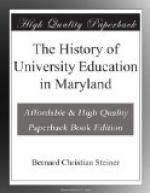My definition puts the hope of extending university education in this sense to the whole nation without exception. I am aware that to some minds such indiscriminate extension will seem like an educational communism, on a par with benevolent schemes for redistributing the wealth of society so as to give everybody a comfortable income all round. But it surely ought not to be necessary to explain that in proposing a universal system of education we are not meaning that what each individual draws from the system will be the same in all cases. In this as in every other public benefit that which each person draws from it must depend upon that which he brings to it. University Extension may be conceived as a stream flowing from the high ground of universities through the length and breadth of the country; from this stream each individual helps himself according to his means and his needs; one takes but a cupful, another uses a bucket, a third claims to have a cistern to himself: every one suits his own capacity, while our duty is to see that the stream is pure and that it is kept running.
The truth is that the wide-reaching purpose of University Extension will seem visionary or practicable according to the conception formed of education, as to what in education is essential and what accidental. If I am asked whether I think of shop-assistants, porters, factory-hands, miners, dock or agricultural laborers, women with families and constant home duties, as classes of people who can be turned into economists, physicists, literary critics, art connoisseurs,—I admit that I have no such idea. But I do believe, or rather, from my experience in England I know, that all such classes can be interested in economic, scientific, literary and artistic questions. And I say boldly that to interest in intellectual pursuits is the essential of education, in comparison with which all other educational purposes must be




